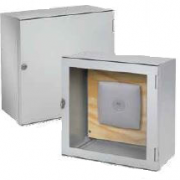Networking Design and Development
Non-Metallic enclosures for Wi-Fi equipment
Advances in technology have compelled the evolution of connectivity and network equipment from centralized data centers – where conditions can be carefully monitored and controlled – to distributed network and wireless applications – where sensitive equipment is subject to harsh environmental elements.
To protect this equipment, specifiers should select encolsure and cabinet solutions that provide reliable protection.
Solutions should isolate and secure vital devices and connections from demanding environments, thus, ensuring optimal performance levels and operational life.

Non-metallic materials are appropriate in many conditions that traditional steel enclosures cannot endure.
Providing excellent corrosion and chemical resistance, non-metallics offer rugged durability – even withstanding rough handling – and enhanced longetivity.
These features make non -metallic cabinets well-suited for protecting indoor and outdoor Wi-Fi equipment. Plus, the materials allow Wi-Fi and WLAN signals to pass through the cabinet unimpeded.
Fiberglass: The most popular Non-metallic
A thermoset polyester material reinforced with glass fibers, fiberglass is the most popular non-metallic material
used in networking applications.
Fiberglass enclosures resist chemicals and temperature changes, offering a cost-effective alternative to stainless steel for corrosive environments.
Composed of a high-performing, engineered composite resin, fiberglass enclosures are typically formed in one of two ways: compression molding or spray-up proccess.
Polyester (Hybrid Polycarbonate/Polyester Blends)
The use of hybrid polycarbonate/polyester blends for non-metalic enclosures is a relatively new option.
Polyester provides excellent impact resistance. While fiberglass alternatives eventually break under extreme pressure,
polyester absorbs the pressure without shattering.
Polyester is flame retardant, it will not ignite when in contact with fire, it performs well under extreme temperature, and also, polyester is less susceptible to scratches and abrasion than fiberglass.
It delivers excellent corrosion and chemical resistance, withstanding the highest range of solvents, alkalis and acids without failure.
Another advantage of Polyester is that – it produces almost no dust, and can be easily drilled and punched for holes and cutouts, even in the field.
It cannot cause skin irritation because it does not contain glass particles. Plus, polyester is made of a recyclable, thermal molded material, making it an eco-friendly enclosure material choice that is broadly accepted worlwide.
In Conclusion:
With the expansion of netwroking equipment, including Wi-Fi application, outside of traditional data center, enclosures and cabinets must offer the protection and flexibility to protect electronic investments – wherever they are located
Non-metallic, composite enclosures and cabinets deliver versatile solutions that won’t impede application performance.


